1890, U.S. Census: total population, 62.95 million (residential); black, 7.49 million (11.9%). Immigration boomed through 1880s, with 5.25 million arriving, most of them Southern and Eastern Europeans, 600,000 from Italy alone. Ellis Island station opens in New York Harbor, January, 1892.
Native Americans, 248,253, down from 400,764 in 1850, a decline of 38.1% in 40 years.
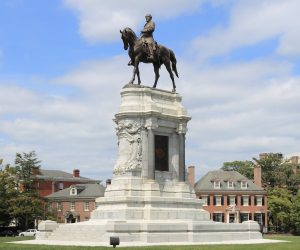 Robert E. Lee statue.
Robert E. Lee statue.
1890, Large equestrian statue of Robert E. Lee is dedicated in central Richmond, May 29.
Nationally, five Confederate monuments are unveiled that year, and seven Union monuments. In 1911, the peak year, the count is 47 Confederate and 13 Union. Many monuments are supported by United Daughters of the Confederacy and other “Lost Cause” proponents.
Richmond’s 21-foot Lee statue is removed from its 40-foot pedestal in September 2021. The pedestal is removed in December.
1890, Republicans propose strong Federal Elections Bill allowing federal courts to supervise elections to Congress to protect black voting rights (and to give Republicans an electoral chance in the South). It passes the House by six votes, July 2, with support of Pres. Benjamin Harrison. This bid to reverse the 1877 reversal of Reconstruction is put forth by Sen. George Frisbie Hoar of Massachusetts and his protégé, Rep. Henry Cabot Lodge.
In Senate, Democrats stop action with a 33-day filibuster. Republican senators give up on election bill to win Southern and Western support for both the Sherman Silver Purchase Act and the McKinley Tariff Act.
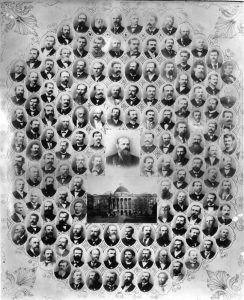 Convention delegates.
Convention delegates.
1890, A new Mississippi state constitution is adopted by a specially elected convention, Nov. 1. There are 133 white delegates, one black. It focuses on poll requirements, adding literacy tests and poll taxes that will serve to keep most blacks from voting. Sen. James Z. George, alarmed by Hoar’s federal elections bill, is a major force in creating the convention and the disenfranchisement measures.
Poll taxes also keep down poor, white vote; but a new grandfather clause (men are automatically registered if their grandfathers had been registered) helps many of them. The electorate is not asked for approval.
This constitution is seen as final codification of the 1875 Mississippi Plan to secure ”white redemption” and political dominance of state government, minus previous reliance on violent intimidation. It is duplicated in large part by South Carolina in 1895.
By 1910 only 2% of black men are registered to vote in Mississippi and Alabama. By 1940, only 3% of eligible African-Americans are said to be registered across the entire South.
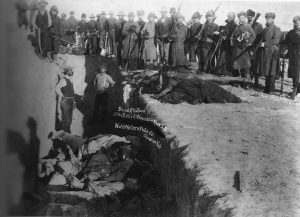 Burying Lakota dead.
Burying Lakota dead.
1890, Nearly 300 Lakota people, including 200 women and children, die at the hands of 7th Cavalry troopers who are trying to disarm a deaf warrior when gunfire breaks out, Dec. 29. Also, 31 soldiers die and 33 are wounded.
Previously, Indians had voiced deep opposition to extermination of buffalo, and failure of U.S. and white settlers to meet their obligations under recent treaties. Considered to be final major incident of the centuries-long Indian wars.
1891, Eleven men, most of them Sicilian immigrants, are shot or hanged by enraged New Orleans mob led by prominent citizens whipped up by newspapers, March 14. Accused of assassinating the New Orleans police chief the previous fall, six had been acquitted by a jury a day earlier; three had won a mistrial and two were awaiting their separate trial.
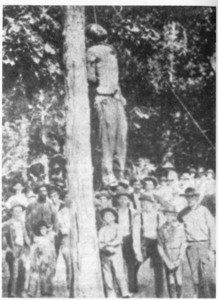 Lynchings on the rise.
Lynchings on the rise.
1892, Ida B. Wells publishes Southern Horrors: Lynch Law in All Its Phases, documenting rise in killings of black men and decrying the frequent charge of rape as a false excuse. She cites white fear of black political and economic progress, and white need to maintain blacks in second-class status. She presents graphic descriptions of lynching, with photos, to large audiences in Britain, 1894. She extends her research in The Red Record, 1895.
1892, Democrats take control of the House, Senate and the presidency with election of Grover Cleveland. The following year they dismantle remaining Reconstruction-era statutes to protect congressional elections in cities; Republicans decline to filibuster, surrendering on black voting rights and on Republican hopes to crack Solid South.
 A boll weevil feeding.
A boll weevil feeding.
1892, Boll weevil crosses the Rio Grande into Texas, probably near Brownsville. Expanding 50 miles a year, it reaches southeast Alabama by 1909 and deeply undermines cotton production. Historians say the infestation hurts sharecroppers in particular and is a factor in the Great Migration of Southern blacks to Northern cities that begins in 1916.
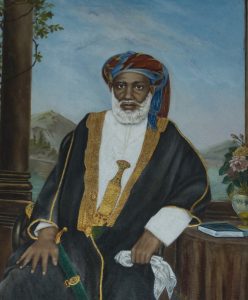 Tippu Tip.
Tippu Tip.
1892, Congo-Arab war breaks out, March, between Arab slave and ivory traders under Tippu Tip (based on Zanzibar) and the new Congo Free State over Leopold’s vows to end the slave trade. Also at stake is control of vast eastern Congo (stretching from Stanley Falls to Lake Tanganyika).
The Free State’s well-armed Force Publique (black, non-Congo troops, white officers) ultimately defeats and expels larger Arab-controlled forces, January 1894. Both sides rely on tribal allies to do much of the fighting (with the Batetela switching over to the Free State). Thousands die on both sides, many from influenza and smallpox.
1892, Dahomey’s King Béhanzin, smarting over France’s 1890 takeover of Porto-Novo and Cotonou, launches provocative slave raids. French Legionnaires, marines and Senegalese soldiers drive up Ouémé valley, killing at least 2,000 of the fierce-charging Fon army (including hundreds of female Minon soldiers). Both sides are well armed, but French also have a machine gun.
Béhanzin is also dealing with smallpox breakout and rebellious slaves on palm-oil plantations. As French approach, he sets fire to his capital, Abomey, Nov. 17.
French commander Alfred Amédée Dodds installs a Béhanzin cousin as king. When Béhanzin finally surrenders in 1894, he is exiled to Martinique. All of Dahomey (present-day Benin) is declared a French protectorate, including the old slave port of Whydah. It had been an independent kingdom since the 17th century.
On Dodds: He was born in Senegal and became France’s leading colonial general. His father’s father was a British officer who married a French-Senegalese woman from a slave-trading Métis family. His mother was also a French-Senegalese Métis.
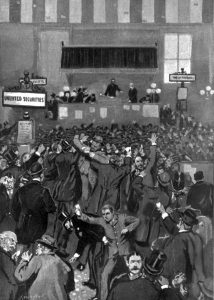 Stock exchange in uproar.
Stock exchange in uproar.
1893, Financial panic, blamed on crashing wheat prices, an oversupply of silver from new mines, a run on U.S. gold by European banks, and the overbuilding of U.S. railroads in the 1880s, is worst so far in U.S.
Stocks plunge, 500 banks close, 15,000 businesses fold, many families lose farms, 25% of rail mileage goes into receivership. Unemployment reaches nearly 20% nationally, 25% in Pennsylvania, 43% in Michigan. Cleveland persuades Congress to repeal Sherman Silver Purchase Act, but criticism mounts.
In 1894, Pullman strike spreads from Chicago to most railroads west of Detroit, 1894 Pres. Cleveland sends in Army; at least 70 die in riots.
Crop prices and the economy begin to recover, slowly, in 1897.
1893, Maxim machine guns are first used in combat at the Battle of the Shangani (in today’s Zimbabwe) by British force of 750 under attack by 3,500 Matabele warriors, Oct. 25. The latter suffer more than 40% casualties.
 Mississippi flag, 1894-2020.
Mississippi flag, 1894-2020.
1894, Mississippi becomes first Southern state to include the Confederate battle flag in the design of its state flag. The flag is virtually unchanged until June 30, 2020, when Republican Gov. Tate Reeves signs the legislative bill withdrawing it.
1894, Republicans regain control of both House and Senate, as Cleveland and Democrats are blamed for the financial depression, in November election. This ends brief, two-year period of Democratic control of both houses and presidency. Last time they held all three was 1858, during the Buchanan administration; next time is beginning of Wilson administration, 1913.
1894, As many as 9,000 miners, both black and white, go on strike around Birmingham, AL, to fight a 22.5% pay cut. But depressed price of coal, thousands of willing scabs and declaration of martial law enable owners to prevail.
1894, In North Carolina, the rising Populist Party (born of the Farmer’s Alliance led by Leonidas Polk) joins with Republicans. Their fusion ticket takes control of the legislature, the Supreme Court and most of the congressional seats, shocking the Democrats.
The new legislature liberalizes access to the ballot, especially for blacks, and sends a Populist and a Republican to the U.S. Senate.
1895, The city of Oyo, a remnant of the old empire, is bombarded at the order of Robert L. Bower, Britain’s resident commissioner, Nov. 12. Bower is miffed that the king, the Alaafin, has castrated a man suspected of adultery with one of the king’s wives. When the questioned king then kills the adulterer, Bower orders the city’s destruction.
The incident underlines that the British are running the Lagos Colony and its hinterland, and that the various kings serve at their discretion. The Alaafin cooperates as Britain expands and consolidates.
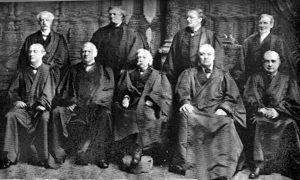 Supreme Court, 1896.
Supreme Court, 1896.
1896, In Plessy v. Ferguson, U.S. Supreme Court upholds, 7-1, Louisiana’s 1890 Separate Car Act requiring “equal but separate accommodations” for white and black passengers on state’s railroads. It erases civil rights accomplished under Reconstruction and permits expansion of Jim Crow segregation laws to every sector of life, South and North. Black people will suffer under them for many decades to come.
The sole dissenter, John Marshall Harlan, writes, in part: “Our constitution is color-blind, and neither knows nor tolerates classes among citizens. In respect of civil rights, all citizens are equal before the law.”
The seven-justice majority includes four appointed by Republican presidents, and two who voted with the majority on the Civil Rights Cases.
1896, In South Carolina, the Democratic Party imposes the first “whites only” rule on its primaries, barring participation by any black or mixed-race person.
Such “whites-only” rules are adopted by Democratic parties or state legislatures in Mississippi, Alabama and Florida (1902), Texas (1905), Louisiana and Arkansas (1906) and Georgia (1908).
1896, William McKinley (Ohio) elected president over Democrat William Jennings Bryan (Nebraska), latter supported by Populists. Republicans add presidency and retain control of Congress, but venture no new bills to support black voters in South.
In fact, Congress will take no action to secure black voting rights until 1957.
1896, In North Carolina, Democrats are again defeated when Republican Daniel Lindsay Russell Jr., a pro-Union plantation owner, is elected governor on the Republican-Populist fusion ticket. George Henry White, a Howard University-trained lawyer and educator, is elected to Congress. He is the House’s only black member in 1897 and, when he leaves in 1901, its last until 1929.
Populists split their vote in the state by supporting Bryan for president.
Fusion candidates are also successful in county and city races, including in black-majority Wilmington, the largest city.
Democrats begin plotting a Mississippi-type back-to-power campaign that leads to the Wilmington Massacre.
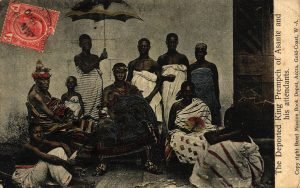 King Prempah I.
King Prempah I.
1896, British precipitate a Fourth Ashanti War with an expeditionary force from Cape Coast arriving in Kumasi in January. King Prempeh I surrenders without a shot fired and is banished to the Seychelles. The Ashanti relinquish sovereignty and become part of Britain’s Gold Coast protectorate.
1897, The Tuskegee Institute reports that 123 black people are lynched this year in the U.S. The institute has been collecting annual data since 1882, when 49 blacks are known to have been lynched.
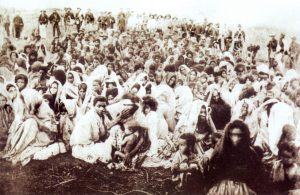 Survivors of Canudos.
Survivors of Canudos.
1897, Rebels in the mixed-race Bahían village of Canudos, led by populist charismatic Antonio Conselheiro (who vows support of the monarchy), repel several Brazilian army attempts at subjugation with heavy losses.
A much larger Brazilian force, armed with artillery and machine guns, still requires weeks of hand-to-hand battle (during which Antonio dies) to force surrender. Soldiers raze village, slaughter more than 5,000 men, and disperse surviving women and children. Total death toll is likely more than 20,000 in Brazil’s bloodiest-ever insurrection.
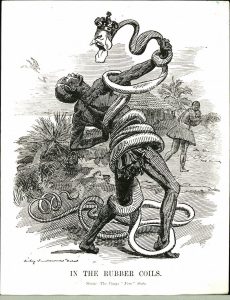 Leopold as snakehead.
Leopold as snakehead.
1897, Production of rubber rises in the Congo, spurred by King Leopold’s decrees, including: All rubber production goes to the Congo Free State (of which he is the owner). Each village is required to meet a quota. Failure to meet quotas results in destruction of villages by Force Publique, severe punishment of individuals, including starvation, imprisonment, even dismemberment of hands.
It’s not chattel slavery; villages and individuals are paid for the latex they do produce, in cloth, costume jewelry and other low-cost trade goods. And they are otherwise left to live their lives. However, since the Landolphia vines die after being cracked open for latex, people must go deeper and deeper into forest to meet quotas.
Between violence, hunger and disease during the Leopold “Free State” era (which ends in 1908), population of the Congo declines by as many as 5 million, perhaps twice as many.
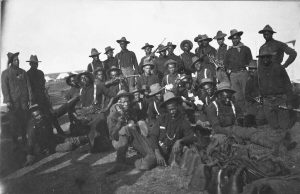 Back home from Cuba.
Back home from Cuba.
1898, USS Maine, sent to Cuba to support Cuban rebels fighting since 1895, explodes mysteriously in Havana Harbor and sinks, Feb. 15. Newspapers and Congress demand war and Pres. William McKinley reluctantly presses Spain to leave island. A 10-week war follows.
Black U.S. army units, including the 10th Cavalry, play central role in battles that lead to surrender of Santiago de Cuba and, ultimately, to Cuban independence, and Spain’s cession of Puerto Rico and the Philippines to the U.S.
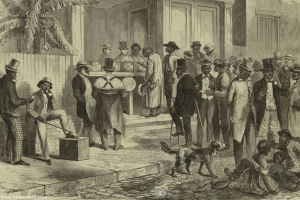 Vote suppression upheld.
Vote suppression upheld.
1898, Virtually all the restrictive, anti-black voting requirements in the 1890 Mississippi constitution are upheld by U.S. Supreme Court in Williams v. Mississippi, April 25. Even Harlan, the “Great Dissenter” in Plessy, joins unanimous ruling, which focuses on lack of discriminatory language, rather than on clearly anti-black intent and practice.
The Louisiana legislature quickly moves to duplicate the Mississippi restrictions and grandfather clause, May 12, followed by North Carolina (1900), Alabama and Virginia (1901), Georgia (1908) and Oklahoma (1910).
And while most of the Southern poll-tax grandfather clauses are struck down by the Supreme Court in Guinn v. United States, 1915, the ruling is of virtually no benefit to blacks seeking to register and vote.
1898, Running a strident “white supremacy” campaign “to redeem North Carolina from negro domination” and championing violence “if necessary,” white North Carolina Democrats take legislature back from Republicans and Populists whose fusion ticket loses many white voters, Nov. 8.
 Rioters outside burned newspaper office.
Rioters outside burned newspaper office.
1898, Two days after the North Carolina election, 2,000 white Red Shirts storm through black-majority Wilmington, commandeer a Gatling gun at the armory, burn the office of the black daily newspaper (an editorial asserted that some white women choose to sleep with black men), terrorize and vandalize the black Brooklyn district, and kill at least 35 black residents (and perhaps scores more).
They demand, at gunpoint, the resignations of the white Republican mayor, Silas P. Wright, and both white and black aldermen, and install their leader, Alfred Moore Waddell.
Republican Gov. Russell directs Wilmington Light Infantry to restore order, but they have little effect. More than 2,000 men, women and children flee the city. Other blacks are banished and describe the riot as a “massacre.” White Democratic business leaders term the takeover a great and righteous success.
1899, North Carolina legislature’s new Democratic majority moves quickly to pass Mississippi-style poll tax and literacy tests to suppress black voting, complete with grandfather clause to protect poor whites from poll tax.
The Democrats’ return to power is complete in 1900 when Democrat Charles Brantley Aycock is elected governor by a 60,000-vote margin, repeating the “white supremacy” theme complete with Red Shirt intimidation (but no further municipal massacres or coups).
No Republican is elected governor in North Carolina until 1972.
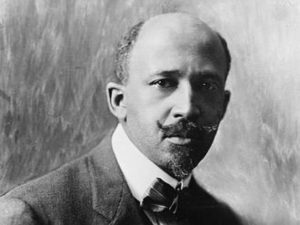 W.E.B. Du Bois.
W.E.B. Du Bois.
1899, W.E.B. Du Bois publishes The Philadelphia Negro, a statistical and sociological portrait of the community, its problems and its relationships with the dominant white world.
Du Bois is in his second year as a professor of history and economics at Atlanta University. He has degrees from Fisk and Harvard, including the first Harvard doctorate earned by a black person.
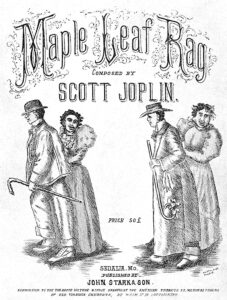 Maple Leaf Rag poster.
Maple Leaf Rag poster.
1899, Scott Joplin publishes “Maple Leaf Rag” for piano, Sept. 18, in Sedalia, Mo. Although not the first rag to be published—that was 1895’s “La Pas Ma La” by Ernest Hogan—it launches rag time across the country. Rag time and blues originally arose in black communities of Louisiana and Texas, and would evolve into jazz in the early decades of the 20th century.
The first published blues songs are “Dallas Blues” by Hart Wand and “The Memphis Blues” by W.C. Handy, both in 1912.
1900, U.S. Census: total population, 75.99 million (residential); black, 8.83 million (11.6%). In 1800, the black population, slave and free, was 18.9% of the total.
Immigration declined in 1890s with Congress excluding Chinese and imposing a 50-cent head tax on all arrivals. But inflow still totals 3.69 million, most of them again from Southern and Eastern Europe.
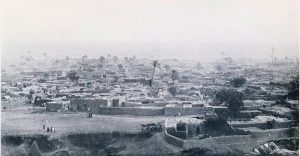 Sokoto Caliphate's Kano.
Sokoto Caliphate's Kano.
1900, Upriver territory held by private Royal Niger Company is merged with Niger Coast Protectorate under British authority.
In 1903, Fredrick Lugard, new commissioner of Northern Nigeria, leads forces against the emir of Kano and sultan of Sokoto in the final subjugation of the Sokoto Caliphate. Slave raiding and trading are forbidden. But slavery continues under Islamic rules and traditions of the Sokoto emirs.
At some point, British, who introduce indirect rule, persuade emirs to accept legislation under which any child born to a slave mother is born free, and encourage giving slaves the means to redeem themselves.
In 1914, the Northern Nigeria Protectorate will be merged with the Lagos Colony to form the single colony of Nigeria, which will become Africa’s largest nation by population. In 1936, slavery in northern Nigeria is banned completely.
